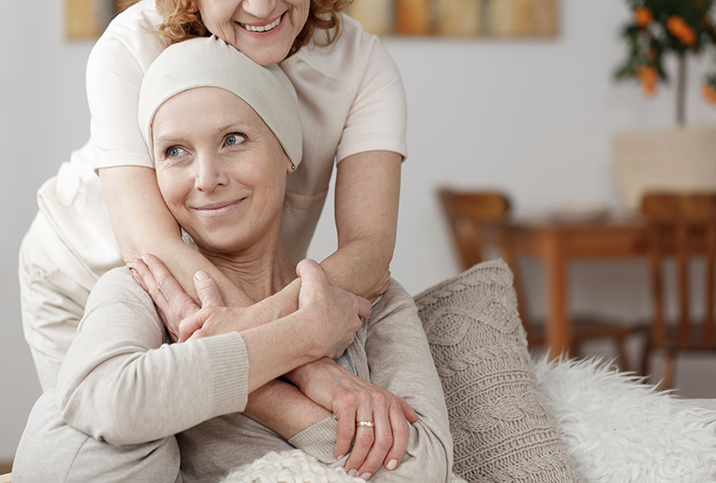Life After Cervical Cancer: Getting to Know Your New Body

You've undergone surgery, radiation, chemotherapy or a mix of the three in multiple treatments. Along with your doctors and oncologists, these treatments have saved your life. There is, however, a cost. While every woman's body reacts differently to cervical cancer treatment, understanding its effects will help you identify physical and mental changes and provide you with the tools to seek assistance when necessary.
Given the high survival rate for cervical cancer patients, understanding and improving your short- and long-term quality of life is essential. Here are some changes you might experience post-cancer.
Weight loss
During or shortly after your cervical cancer treatment, you might notice a change in your body mass. Nausea can make the thought of eating even your favorite foods unappealing, and mouth sores can make chewing solids difficult. Combined with diarrhea, these side effects can lead to weight loss of varying degrees.
Let your doctor know if your weight changes quickly or drastically. There are dietary considerations and medications to balance your weight.
Fatigue
Fatigue is a major issue with cancer treatment. It's a lot for your body to take, and traveling to and from hospitals and clinics for appointments can be taxing. If you work or have a family to care for, exhaustion can rule, presenting as dry eyes, skin irritations, mood swings and headaches. The tiredness may continue for several months or even a year or two after treatment has finished.
Plan your day around your energy peaks. Relax when exhaustion hits, but limit naps to 30 minutes or less so you get a good night's sleep. Try light exercises or walking. Ask family and friends for help with errands or the kids, and reach out to your healthcare providers for tips to keep you energized.
Hair loss
Most cancer treatments damage the cells in hair follicles, causing hair loss. While your hair is bound to grow back within a few weeks after treatment ends, hair loss can be distressing. Hair loss strips you of an escape, reminding you of your illness every time you see a person's reaction or look in the mirror.
Protect your scalp with a favorite hat, wig or scarf. Consider a shorter hairstyle or a clean shave. Most of all, be patient. Hair does grow back.
Bowel changes
After surgery or radiation therapy, you might notice changes in your bowel habits. You may experience constipation or diarrhea or feel pain in your abdomen. Bloating can make your clothing tight and uncomfortable. While bowel issues caused by cancer treatments are usually temporary, some women experience a permanent change in the way their bodies absorb fluids and nutrients.
Consider a diet that reduces abdominal gas and inflammation. Limit spicy and greasy foods known to irritate the digestive system. Drink plenty of water. Talk to your doctor or dietitian about making changes to your diet, or ask about medications.
Urinary incontinence
Bladder control may change after treatment. Some women find they need to urinate more often or in a hurry. Others note the involuntary loss of urine when they cough, sneeze or laugh. This is called urinary incontinence, and approximately 20 percent of cervical cancer survivors experience this long-term.
Ask your doctor to refer you to a continence nurse or physiotherapist. Strengthening the muscles needed for urinary control can help manage urinary incontinence.
Lymphedema
Damage to your lymphatics due to surgery or radiation therapy can cause lymph fluid to collect in your legs. This swelling is called lymphedema. Lymphedema can occur during or after treatment, even months or years later, and may worsen over time.
To manage lymphedema, avoid pressure, injury or infection to the lower limbs. Gentle exercise, compression stockings and a type of massage called manual lymphatic drainage can reduce swelling. A physiotherapist trained in lymphedema management can give you further advice.
Menopause
If your ovaries have been damaged by radiation therapy or chemotherapy, or they've been surgically removed, your body will no longer produce estrogen and progesterone. When these hormones are no longer made, your body stops its menstrual cycle. This is called menopause. Symptoms of menopause can include hot flashes, mood swings, trouble sleeping (insomnia), tiredness and vaginal dryness. Menopausal symptoms caused by cancer treatments are usually more severe than natural menopause as the body struggles with the drastic drop in hormones.
Sexuality issues
Cancer treatments can cause emotional and physical changes that make having sex difficult. If your libido has checked out or sex is painful, let your partner know. When your body no longer produces estrogen, your vagina can become dry. Sometimes vaginal tissue will lose elasticity and shrink, narrowing the vagina (vaginal stenosis). While vaginal stenosis should not affect your ability to orgasm, it can make vaginal sexual intercourse discomforting.
Your doctor may suggest having regular, gentle vaginal sexual intercourse with your partner, or a vaginal dilator, to help the walls of your vagina. You can also explore other ways to be intimate, such as massage and cuddling.
Fertility issues
Cervical cancer treatments can affect reproductive organs and cause infertility. You may be devastated to learn you are no longer able to have children and might worry about the impact on your relationship or future relationships. Even if your family is complete, or you were not planning to have children, you may feel a loss.
If you have a partner, talk about your feelings. Speaking to a counselor may also help. For some women, there may be options for having children after treatment. Ask your doctor or a fertility specialist about the options available to you.


















